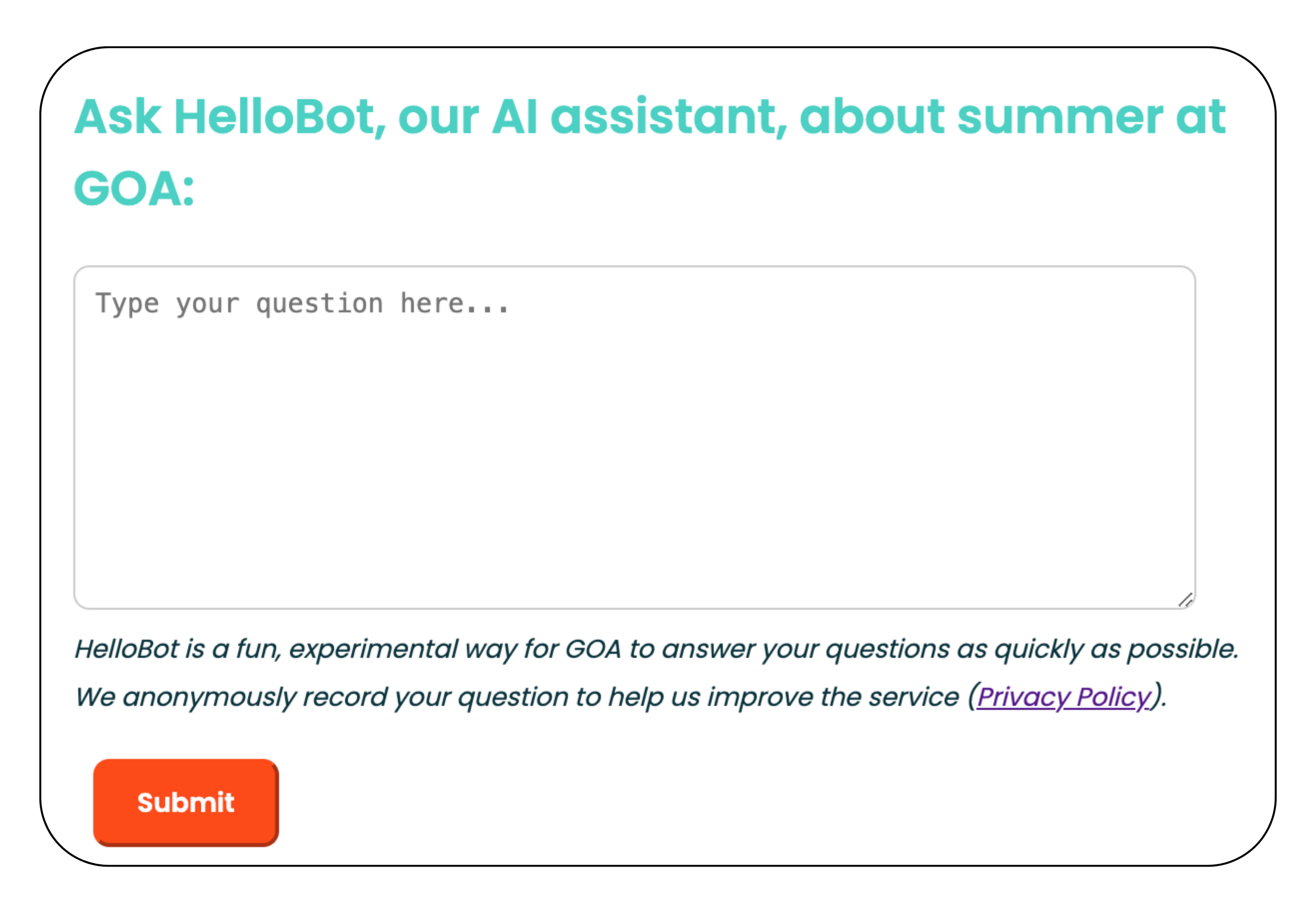Summer Courses for High School Students
Explore, Engage, Excel with GOA this Summer
Empower your student to explore college and career pathways, gain global perspectives, and earn valuable school credits, all through a flexible, engaging summer program. In the company of curious, globally-connected peers, students learn in an enriching, collaborative learning environment. Concluding with a GOA transcript, students have the opportunity to get ahead, earning semester or yearlong credit, setting a solid foundation for their academic journey ahead.
Benefits of GOA Summer Courses
- Explore a topic of interest
- Develop relevant skills
- Prepare for college and beyond
- Connect with peers from around the world
- Create authentic artifacts of learning that can be shared in the college admissions process
Summer Courses
Summer 2024: Monday, June 17 - Friday, August 2
Summer 2024 will run from Monday, June 17 to Friday, August 2, offering over 20 of GOA's most popular semester courses in an intensive seven-week format for all high school students. Accredited by the New England Association of Schools and Colleges and by the Western Association of Schools and Colleges, GOA provides an official transcript after course completion, which may be eligible for school credit at students’ home schools. Download the summer course catalog here.
- Abnormal Psychology
- Academic English Accelerator
- Algebra I
- Architecture
- Business Problem Solving
- College Essay Workshop
- Computer Science I: Computational Thinking
- Computer Science II: Analyzing Data with Python
- Computer Science II: Game Design & Development
- Computer Science II: Java
- Creative Nonfiction Writing
- Cybersecurity
- Digital Photography
- Fiction Writing
- Genocide & Human Rights
- Geometry
- Health & Fitness
- International Relations
- Introduction to Artificial Intelligence
- Introduction to Branding & Marketing
- Introduction to Legal Thinking
- Introduction to Psychology
- Investing I
- Medical Problem Solving I
- Microeconomics
- Personal Finance
- Precalculus
- Problem Solving with Engineering & Design
Most of these summer courses cover a semester's worth of material and expect a 10-12 hour per week commitment from students. For Algebra I, Geometry, or Precalculus, which are designed to replace yearlong high school courses, students should expect to dedicate 15-20 hours per week.
GOA courses are primarily asynchronous, meaning that students do not need to attend pre-determined class meeting times. Instead, teachers design and publish coursework and calendars, and students can, within that framework, work on their own schedules. See more about the summer course schedule in the FAQs below.
The cost of most GOA summer courses is $800 per enrollment for students from member schools and $1,200 per enrollment for students from non-member schools. Algebra I, Geometry, and Precalculus are more intensive than our other summer courses and cost $1,100 for students from member schools and $1,400 for students from non-member schools. The College Essay Workshop, a two-week program designed to assist students in crafting their college application essays, costs $250 for students from member schools and $350 for students from non-member schools.
Required and recommended course materials can be found here.
Join students from a diverse range of schools (and more)
- “I took the Precalculus summer course in the Summer of 2023…It prepared me above and beyond for the concepts I am now learning in Calculus 1 (aka Calculus AB) as a junior. I’ve taken GOA courses before, but it was my first Summer one, meaning the learning was more condensed and fast-paced. Even then, I felt the teacher was very in tune with our needs, communicating constantly, making adjustments as necessary, and pacing the class very well.” Galia Student, University Prep
- “Social psychology was the second GOA course that I completed. It was super fun and I loved learning about different concepts that my school didn’t offer. Getting to know other people’s perspective from different parts of the world was super interesting and helped to broaden my learning. Not only did I get to learn the theory of social psychology but I was able to apply my knowledge in my real life which was super cool. Overall this was an amazing course and I learned so much content!” Hwee-Lin Student, St Michaels Collegiate
- “My daughter loved her GOA class. She found it to be very rigorous, which was exactly what she was hoping for in this class. Her teacher was in a different country and classmates were around the world. To learn from and collaborate with people from all over the world was an amazing experience.” Erin O'Neill Parent
Have a question about summer?

Explore topics you care about
With peers around the world










